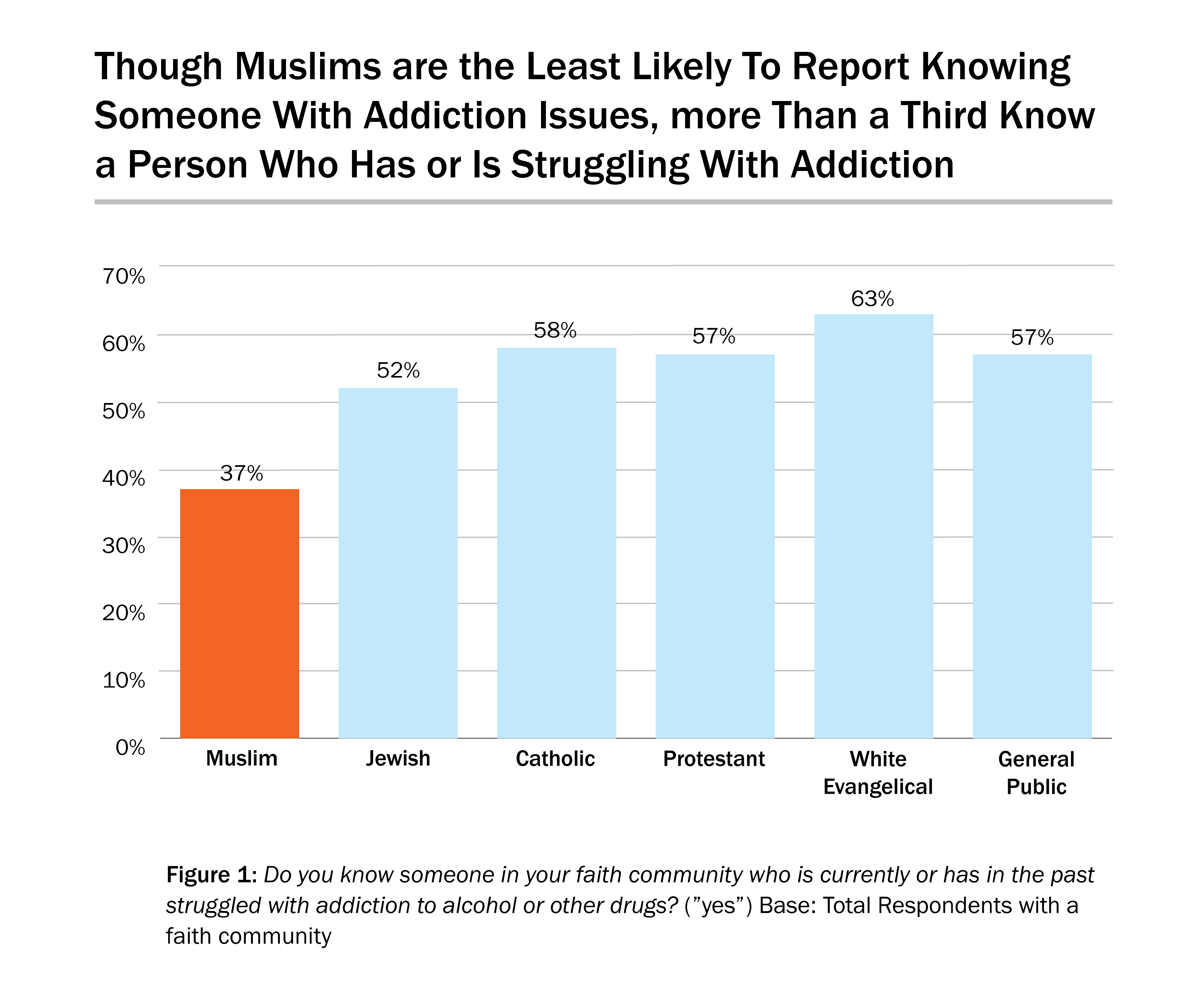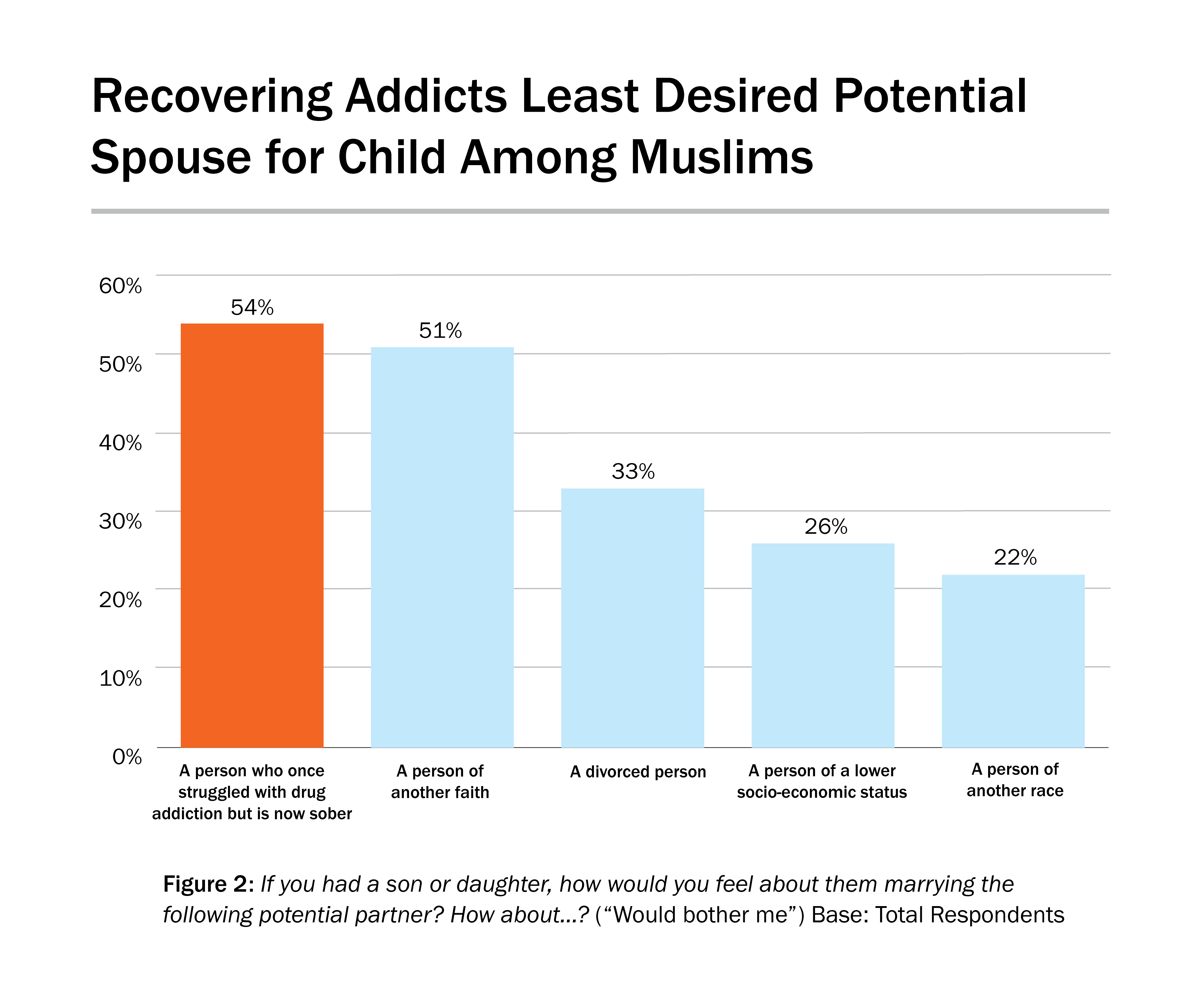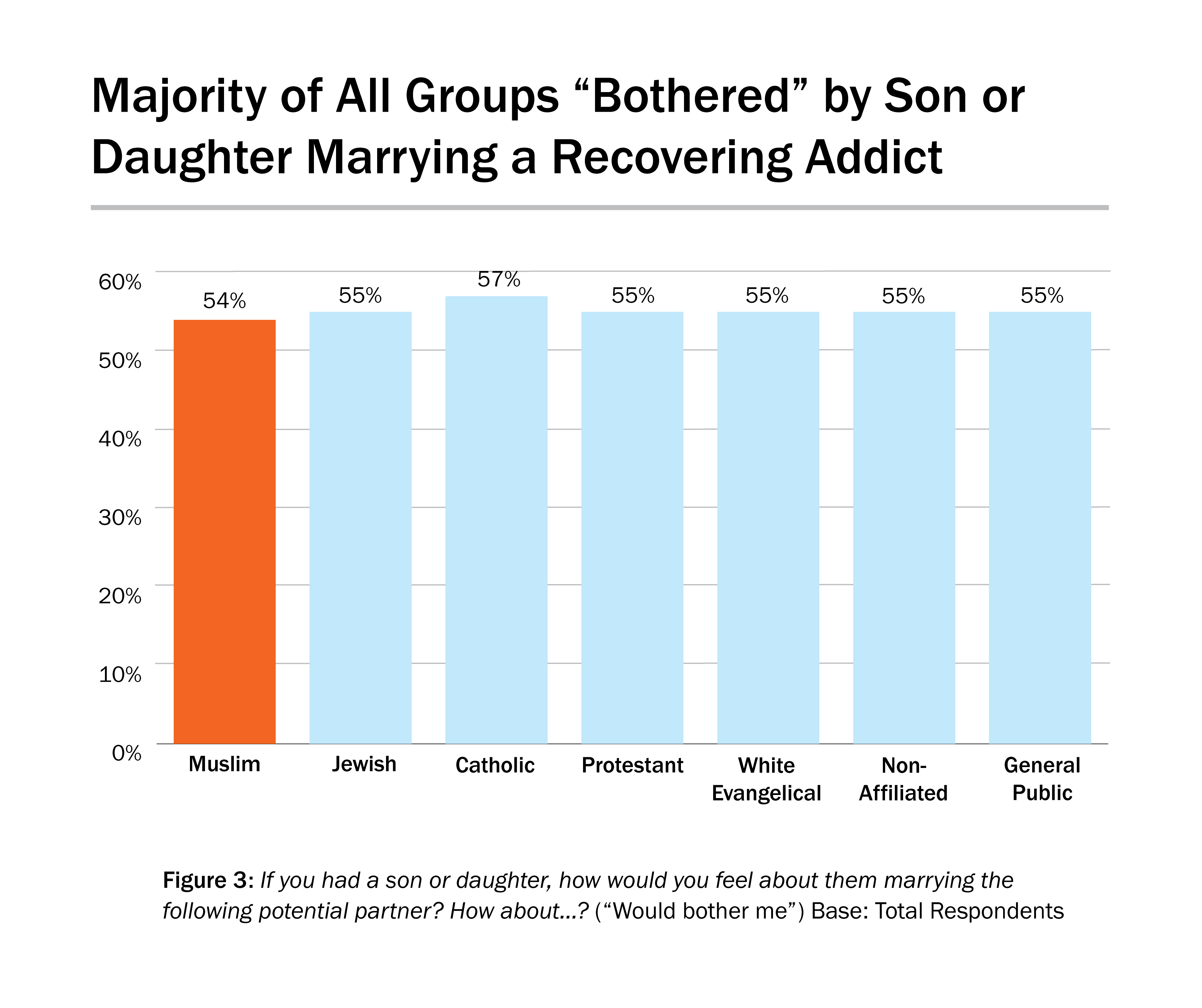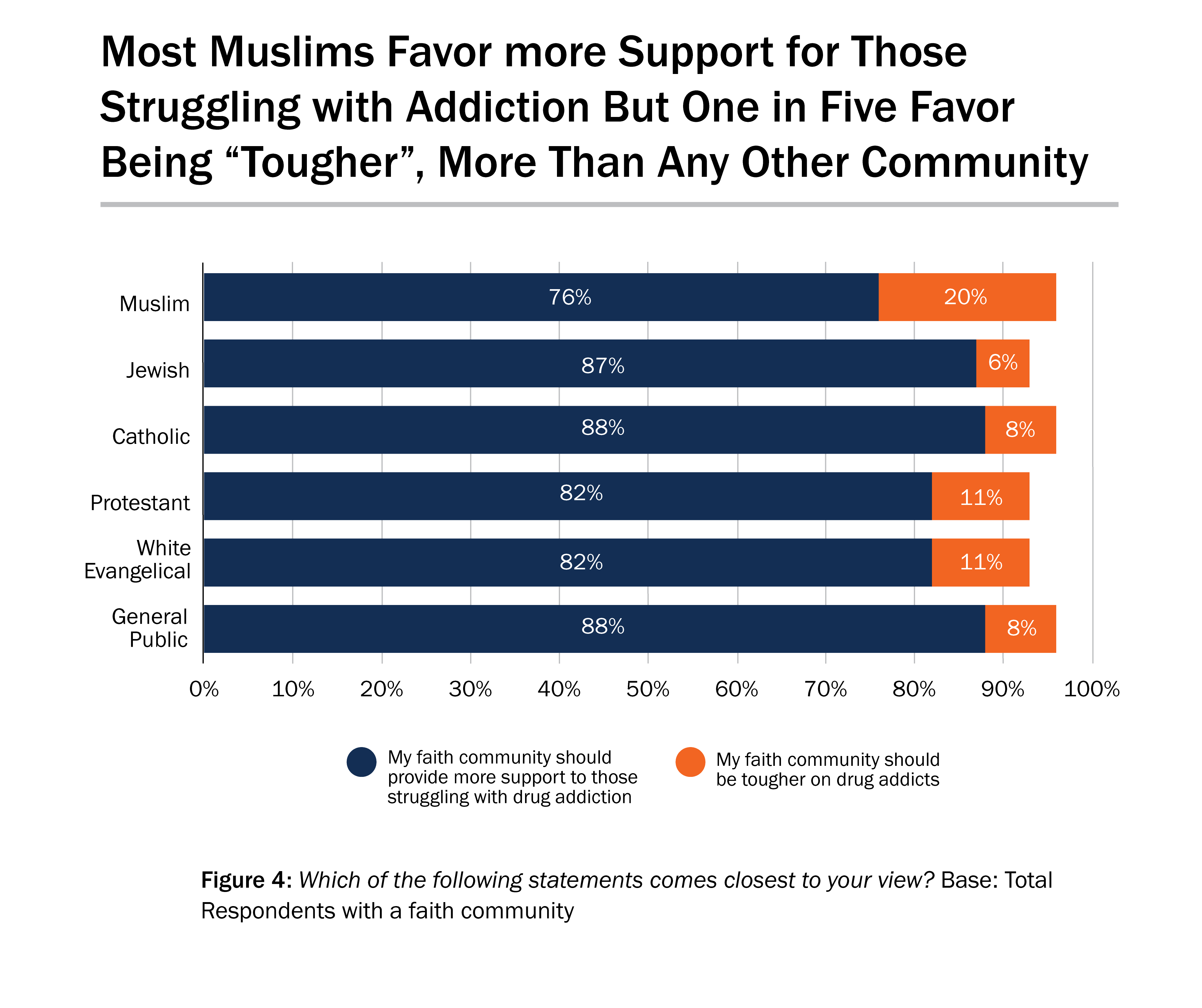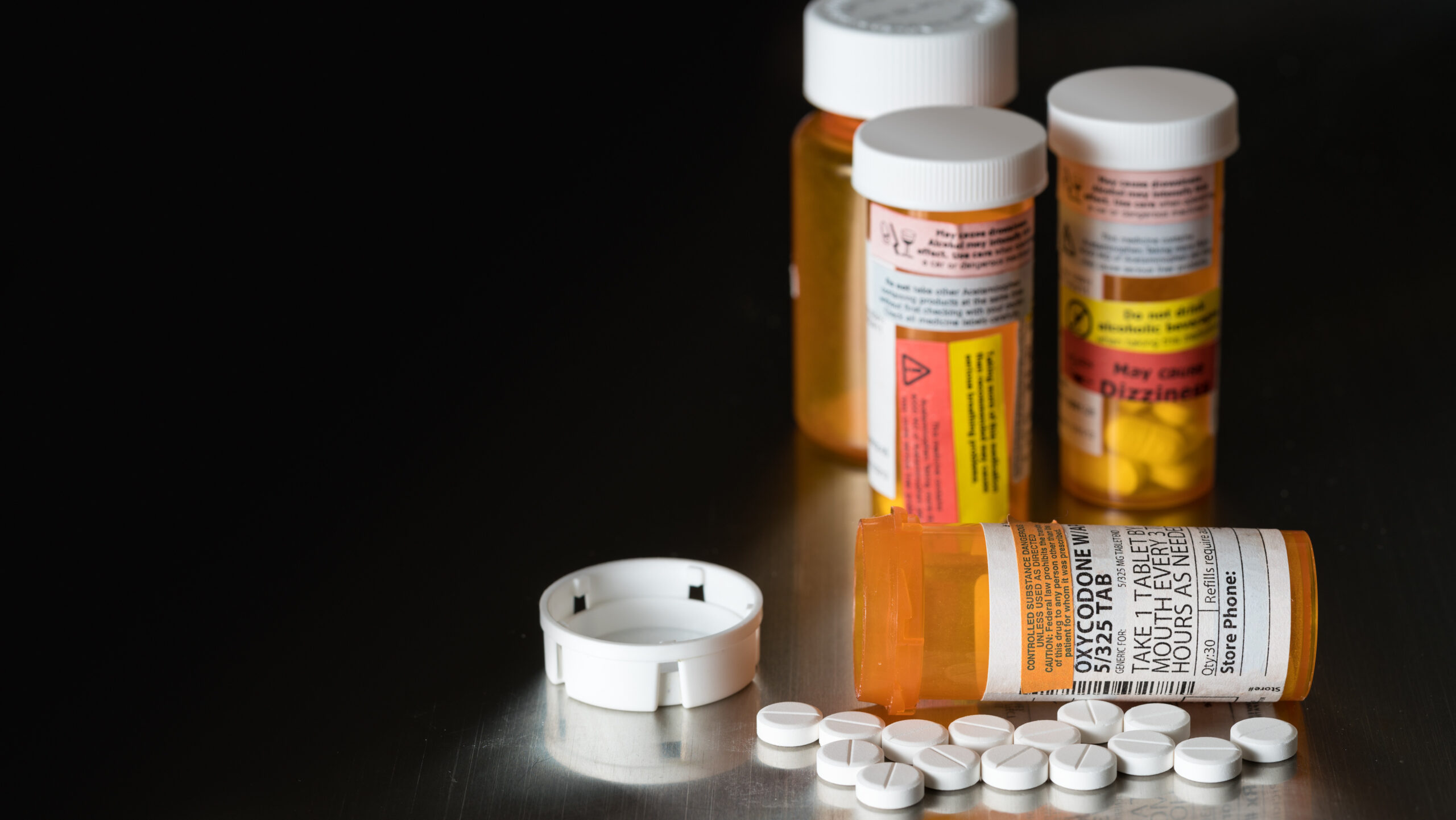
Substance Abuse and Addiction in the Muslim Community: Facing Stigma and Seeking Support
October 6, 2021 | BY DALIA MOGAHED
According to the Addiction Center, the United States, the wealthiest nation on Earth, has seen a decrease in life expectancy since 2014. “Diseases of despair”— substance abuse and suicide—contribute significantly to this trend—and Muslims are not immune.
Consider these figures:
-
- Almost 21 million Americans have at least one addiction, yet only 10% of them receive treatment.
- Drug overdose deaths have more than tripled since 1990.
- From 1999 to 2017, more than 700,000 Americans died from overdosing on a drug.
- Alcohol and drug addiction cost the U.S. economy over $600 billion every year.
- In 2017, 34.2 million Americans committed a DUI, 21.4 million under the influence of alcohol and 12.8 million under the influence of drugs.
- About 20% of Americans who have depression or an anxiety disorder also have a substance use disorder.
- More than 90% of people who have an addiction started to drink alcohol or use drugs before they were 18 years old.
- Americans between the ages of 18 and 25 are most likely to use addictive drugs.
(Source: Addiction Center)
These alarming statistics, while based on studies of the entire American population, impact the American Muslim community as well.
DOWNLOADS
MORE ANALYSES
The (Dis)parity of White Muslim Political Attitudes
American Muslim Policy Priorities
Five Surprising Facts about Divorce in American Muslim Communities
Not Immune: Some Muslims in America Internalize Islamophobia
Unwanted Sexual Advances from Faith Leaders Are Equally Prevalent Across Faith Groups
Muslims Profess More Private Religious Devotion, Less Public Religious Assertiveness
The Majority of Muslims Believe Poverty Is the Result of Bad Circumstances, Not Bad Character

Drug Addiction In The Muslim Community: Facing Stigma and Seeking Support
October 6, 2021 | BY DALIA MOGAHED
According to the Addiction Center, the United States, the wealthiest nation on Earth, has seen a decrease in life expectancy since 2014. “Diseases of despair”— substance abuse and suicide—contribute significantly to this trend—and Muslims are not immune.
Consider these figures:
-
- Almost 21 million Americans have at least one addiction, yet only 10% of them receive treatment.
- Drug overdose deaths have more than tripled since 1990.
- From 1999 to 2017, more than 700,000 Americans died from overdosing on a drug.
- Alcohol and drug addiction cost the U.S. economy over $600 billion every year.
- In 2017, 34.2 million Americans committed a DUI, 21.4 million under the influence of alcohol and 12.8 million under the influence of drugs.
- About 20% of Americans who have depression or an anxiety disorder also have a substance use disorder.
- More than 90% of people who have an addiction started to drink alcohol or use drugs before they were 18 years old.
- Americans between the ages of 18 and 25 are most likely to use addictive drugs.
(Source: Addiction Center)
These alarming statistics, while based on studies of the entire American population, impact the American Muslim community as well.
Personal Experience With Addiction Less Frequent Among Muslims
According to a ISPU’s 2020 American Muslim Poll, a national survey of American adults broken down by faith and non-faith groups, a significant segment of the Muslim American community reports knowing someone in their faith community who is currently or has in the past struggled with addiction to alcohol or other drugs, albeit less than other groups. Among Muslims, 37% say they know a person personally who has or is struggling with addiction, compared to 57% of the general public and roughly the same percentage among other faith groups.
There is no gender or age difference among Muslims in this response. Asian Muslims are less likely (20%) than all other races to report knowing someone in their faith community struggling with addiction.
Stigma
Though addiction to alcohol and other drugs maybe less prevalent in the American Muslim community than in the general public, it cannot be denied or ignored, especially in the face of stigma.
According to The Detroit News:
“Painkiller addiction is a growing problem nationwide, but in Dearborn, which has a large Muslim population, experts say the issue is exacerbated by addicts refusing to seek help because they fear being ostracized.”
According to the 2020 American Muslim Poll conducted by ISPU, stigma faced by those struggling with substance abuse is indeed a challenge among Muslims.
First, recovering addicts, people who used to abuse drugs or alcohol but are now sober, are cited as the most undesirable potential marriage partner for a son or daughter among all tested possibilities, including someone of another faith, a divorced person, someone of lower socio-economic status, or someone of another race.
We found no gender or racial differences in this view, but younger Muslims (18-29 year olds) were less likely to be bothered (44%) than their elders (62% of 30-49 year olds, 60% of 50+).
Muslims are not alone in this regard. A majority of members in all religious and non-faith groups ISPU studied also said it would bother them if their child married a recovering addict, with no measurable difference across faith groups.
Marriage desirability is meant as a proxy measure for social desirability and stigma. The more a quality would “bother” a potential parent-in-law, the more it is socially undesirable and stigmatized in a community. Though a history of drug addiction is as likely to bother members of other faith and non-faith communities, in more close-knit communities, like Dearborn, where marriage prospects are more likely to be based on community reputation, there is even greater incentive to keep struggles with drug addiction secret and therefore delay seeking treatment.
Finding Community Support
The problem compounds when adding community members’ attitude toward addiction outside the question of marriage. First, let us make clear that the vast majority of Muslims (76%) choose the statement that their faith community “should provide more support to those struggling with drug addiction” over the statement that their faith community “should be tougher on drug addicts” (20%). That said, Muslims are significantly more likely than other groups to favor the “tough” approach. Whereas 20% of Muslims say their community should be tougher on drug addicts, this view is shared by only 6% of Jews, 8% of Protestants, and 11% of Protestants and white Evangelicals.
But not all Muslims are equally in favor of “toughness” over “support.” While there is surprisingly no gender or even age difference among Muslims in this view, there is a racial divide. Black Muslims are less likely (14%) than white Muslims (27%) to favor a “tough” approach, with Arab and Asian Muslims falling in between. Black Muslims are however much more likely (14%) than Black Americans in the general public (3%) to favor a tough approach.
With a sizable segment of the community viewing drug addiction as best addressed with “toughness” versus support, it may be that much harder to discuss the problem, connect those in need with resources, or find acceptance.
One may assume that more personal engagement with those struggling with addiction may lead to greater compassion.
However, for Muslims, there is no significant difference between people who know and do not know someone struggling with addiction regarding their chosen response to addiction. Whereas 74% of those who know someone struggling with addiction say communities should provide more support, the same proportion (77%) of those who do not know someone struggling with addiction say the same.
Substance abuse in the Muslim community is seldom studied, nor are the community challenges and perception of seeking treatment examined in an evidence-based manner. Moreover, few experts or treatment centers based in Muslim communities exist, and even less is known about effective treatment strategies, or the challenges and opportunities of building community-based interventions. Much more research is needed to address this gap.
Those struggling with an addiction or looking to support a loved one can connect with SAMHSA for resources.
Also see: https://www.ispu.org/preventing-and-treating-drug-use/
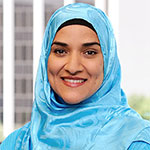
Dalia Mogahed is the Director of Research at the Institute for Social Policy and Understanding, where she leads the organization’s pioneering research and thought leadership programs on American Muslims. Learn more about Dalia→


